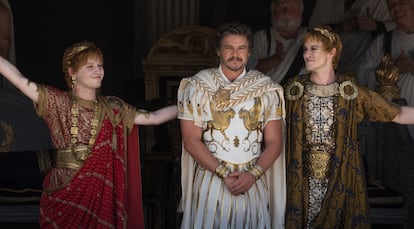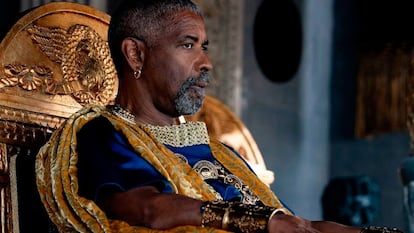It’s been 24 years since that magnificent premiere Gladiator, and Ridley Scott has been very aware of this. Generation X, those of us who were in our twenties then, are now adults. Scott seeks new audiences and it is evident in the evolution of his latest films to new commercial needs.
If something stands out in Gladiator II It’s fantasy. Its sequences overflow with ingenuity, (excessive) imagination, creativity and unreality. Impossible animals like the rhinoceros ridden by a gladiator, sharks in a naumaquia (naval battle) and the baboon spawn are proof that this is not a film whose objective is reality. And I am not going to talk about the lack of historical rigor because it was predictable.
The sequences have a comic-like appearance, something that is already announced with the appearance of Peter Mensah (Jugurtha), a typical actor in this type of film. Another curious element to highlight is the unrealistic performance of Connie Nielsen (Lucilla), very dignified, but very un-Roman. Without modesty in dress, and she is not convincing either as a patrician or as a mother. Of course, the greatest weight is given to Denzel Washington (Macrinus), the true protagonist of the story. He won’t be able to say that it is one of his best roles, although as a good actor he is up to the task. Nor do I think it is chance that has chosen two characters so physically similar: Paul Mescal (Jano) and Pedro Pascal (Acacio). Facing each other they look like a mirror.
The story is too typical and very predictable, although Scott has tried to play with several twists, which are left hanging and leave us halfway. Sequences and explanations seem to be missing.
The decline of the imperialist Roman world, which is so reminiscent of today, is well brought up with an indisputable parallel between President-elect Donald Trump and Geta and Caracalla. I am sure that the choice of the hair color of the two emperors is not made at random, nor is it a simple visual game. The one who dies is Geta, at the hands of his brother, a fight between two psychological aspects of the same character. Does Scott mean to tell us that Trump will succumb at his own hands? History tells us that it was like this, Geta died at the hands of his brother, but the presence of Macrino is a liberty that the director has taken. I imagine it is his way of telling us that Macrinus was the one who ruled after Caracalla after dethroning him. But no, he was not a lanista.
In the film there is no shortage of nods to many other films. Also to those of Romans like Spartacus by Kubrick, with that “I am Spartacus”, but which goes unnoticed in Gladiator II because it doesn’t give enough glorious impact to the moment. Or the way of fighting and cutting off heads, as Spartacus. One of the sequences vaguely reminds me of the damnation to beasts of The sign of the crosswith flower garlands. There are other moments that evoke other films: the histrionic amphitheater sequences are an adaptation of similar ones that appeared in the hunger games, and the mounted rhinoceros is too reminiscent of Star Wars: Attack of the Clones, when Anakin rides a bug very similar to this one to escape from a damnation to beasts In a galaxy far, far away. Clichés that the director knew in advance would work. Some fitted more accurately than others.
Ridley Scott always bets on a strong artistic impact in his films. What he is a genius at is using pictorial art in his cinema. Yes in Gladiator of 2000 is inspired by the painter Alma-Tadema, in Gladiator II He has opted for two opposing pictorial currents. The opulence and decrepitude of the Roman world is surface with Rococo style, the French Baroque of the 18th century. It even sneaks in some gilded floats in the European imperial style of past centuries. The Rome of the Republic, from SPQR, is represented with images of the great painters of romanticism, with the full moon in the sky, darkness, clouds and ruins. The Baroque accompanies the emperors, Romanticism accompanies Janus.
Overall, the film has a tremendous lack of impact, something we had become accustomed to with its first Gladiator. It lacks epic, which it makes up for with the music and scenes from the first. The plot is slow, and as in Napoleon Feelings and mental health take precedence over apotheotic and vibrant scenes. If you hope to get out of Gladiator II With a rush of adrenaline, forget it. This is a film that is closer to Pompeii by Paul WS Anderson (2014) who Gladiator of 2000.
Not even the show moments are results. Not to mention the errors that accompany them. The executions of those sentenced to death were not as they are presented in the movies. In the naumachias Only those sentenced to death participated. Gladiators never fought animals (let alone rode rhinos). Sharks were never used in a show.

Aidan Monaghan (Paramount Pictures Spain/EFE)
Rome is white and not colorful. In some sequence a Renaissance church has been sneaked in. They are too low-cut. The gladiators are missing helmets, some that they do wear are from soldiers from the Republican era. The exceptions are those that are a copy of the genuine gladiator ones found in the ruins of Pompeii.
Feelings, lack of impact. Very bucolic, idyllic and poetic. Without a great patriotic weight (as a Roman film should be), nor epic (how I have missed it!!). Are Roman movies going to be like this from now on? We will have to get used to it, we want to enjoy the new cinema with a historical setting that is coming to us. Now, dressing the actors in a cuirass, a toga or a stole is more than enough to call them “Roman”.
I am sure that this film will not leave anyone indifferent. The reviews range from those who think it is magnificent to those who think it is mediocre. I don’t think I’m in a position to evaluate a film that, like good Greek and Roman myths, has sought to adapt to new contexts.
It’s been a long time since we stopped calling these movies peplumThose times passed many decades ago. These new “Roman” films are something else. The comic, the graphic novel, even the short TikTok videos turn the cinema that should be epic into a decaffeinated story, which eternalizes on the screen where what stands out are the feelings and in which even in some scenes it seems that the characters are doing therapy to understand his childhood.
If you are going to see Gladiator II, Remember: it is not a historical film, it is a historical film. Enjoy it, and if you want to know about ancient Rome, read essays, don’t go to the movies. Cinema is only spectacle.

